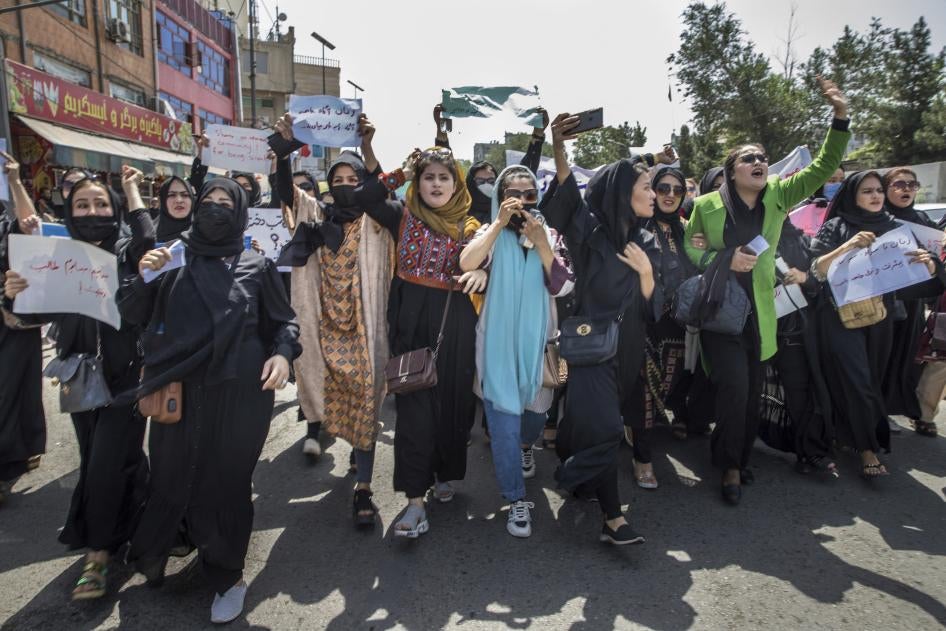Women’s rights are human rights and, as such, are nonnegotiable.
But there’s been no shortage of examples of egregious violations of women’s rights over the past year.
Iran cracked down on women and girls who protested the government’s decrees on how they should dress and act. In Afghanistan, the Taliban denied women and girls’ basic rights, including to education, l jobs, and freedom of movement. In the US, many states severely restricted access to abortion. The United Kingdom has excluded some migrants from the protections offered by a convention tackling violence against women. Some people in Costa Rica’s government want to limit abortions for life-threatening pregnancies.
As these examples show, it’s not just authoritarian governments that violate women’s rights – women face these restrictions in democracies, too. But the heartier democratic institutions are, the more tools women have to fight back. In countries with a strong rule of law and functioning checks and balances, women are better able to protect their rights — and so is everyone else.
If a government recognizes press freedom and freedom of expression, women can speak out against rights abuses. Women are more likely to seek justice when courts are independent and impartial. When labor rights and the right to education are respected, women and girls can advance more quickly toward equality. When women can vote and be elected, they can help elect candidates who believe in women’s autonomy.
When all these checks and balances are in place, women can expect a more level playing field to advance the recognition of rights. Institutions that can hold the executive to account are also signs of a healthy democracy.”
This is why, when we see women’s rights rolled back, it’s a flashing red light. The checks and balances that everyone relies on may be at risk or no longer functioning, and the slide to a less rights-respecting – even authoritarian – government may be under way.
One of the most threatening risks comes from courts becoming politically controlled.
Poland’s politically compromised Constitutional Tribunal effectively banned abortion in the country. Now, the country has stooped to the outrageous practice of prosecuting women’s rights defenders, restrictions on freedom of expression and association that should concern everyone.
Almost one year ago, the US Supreme Court overturned longstanding federal protections for abortion. To make matters worse, a judge in Texas could order a total ban across the United States on a safe and widely used medication for abortion, which was approved by the Food and Drug Administration more than two decades ago. In a well-functioning democracy, women would not have to fear that their rights could disappear overnight through a court order, a legislative vote, or an executive order without another branch of government stepping in to remedy it.
In some parts of the world, the connection between the fight for women's rights and authoritarianism is more apparent.
The protests in Iran, sparked by the death of Mahsa (Jina) Amini shortly after her detention by Iran’s so-called “morality police,” show that restrictions on women’s rights do not happen in isolation. The restriction on women’s rights in Iran and the unrelenting brutal crackdown against peaceful dissent are visible hallmarks of the country’s authoritarian government. A country, regardless of its system of government, will never function at its highest potential without women’s equality.
The Taliban has put Afghanistan on a treacherous path – depriving half the population’s rights to life, health, and other core rights – and in doing so condemned the entire society to horrible suffering from which it will be difficult to recover.
Yet in the face of this repression, there is always hope.
The rise of international human rights law has provided a powerful tool to protect and expand women’s rights. Women have used international law to push for local change. The Inter-American Human Rights system, which promotes and protects rights in the Americas, contributed to making states responsible for ending domestic violence, triggering legal changes around Latin America. Thanks to international law, rape is finally recognized as a war crime and as a form of torture. International human rights law has also contributed to pushing countries to accept different types of families so that motherhood is treated as a right, not an obligation.
Advances on abortion access across Latin America as well as in other parts of the world such as Ireland also let us know that change is possible. Women globally rejoiced when Colombia decriminalized abortion up to 24 weeks of pregnancy. In Mexico, 11 of 31 states have decriminalized abortion in recent years.
Everyone should know that when governments can control what women wear, where they can go, and their pregnancies, these are signs of creeping authoritarianism. And when governments have the ability to enforce arbitrary laws against women, they can in fact hold this power over anyone they choose, creating a system ripe for corruption and abuse.
Women know this only too well.










